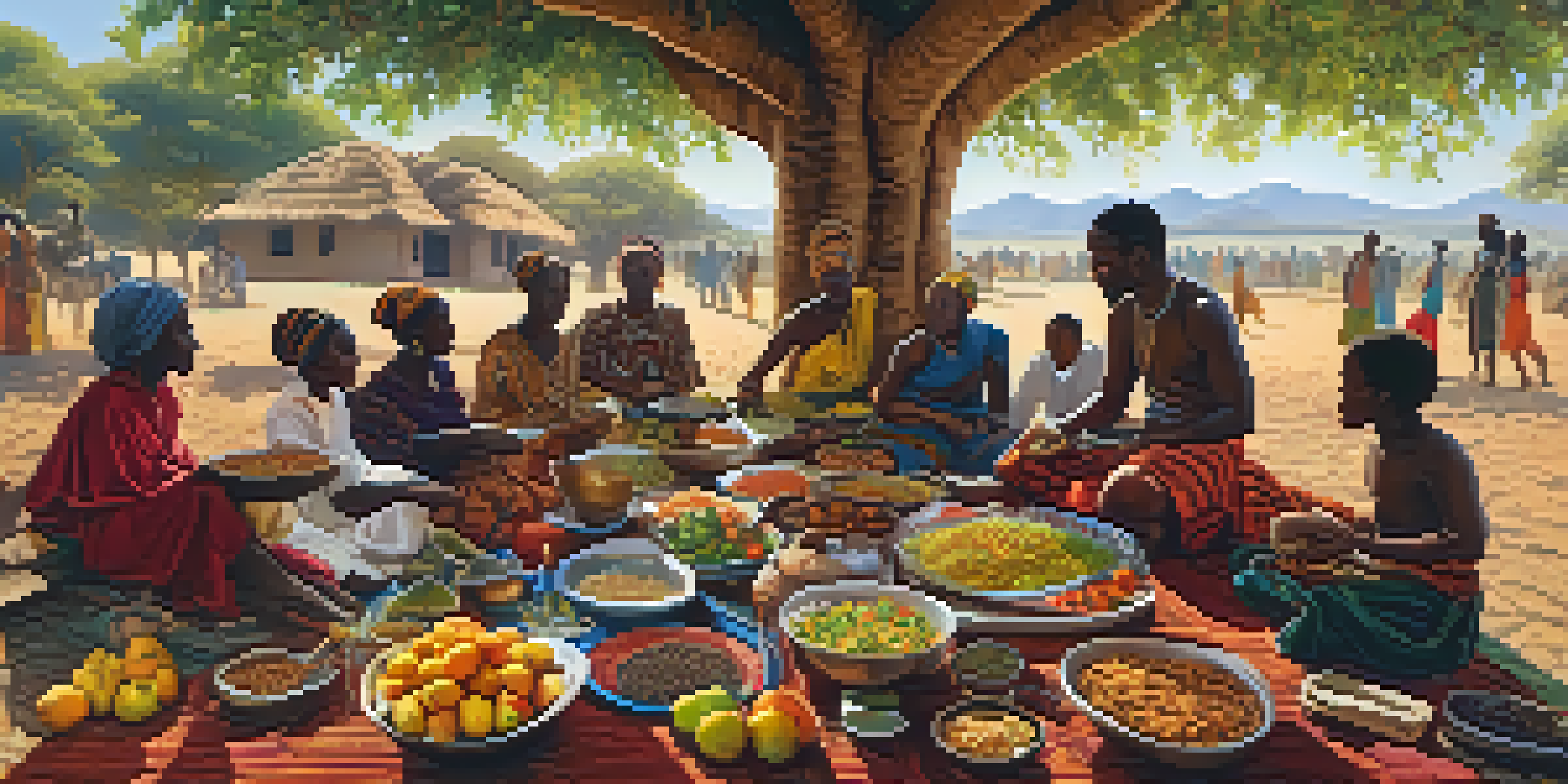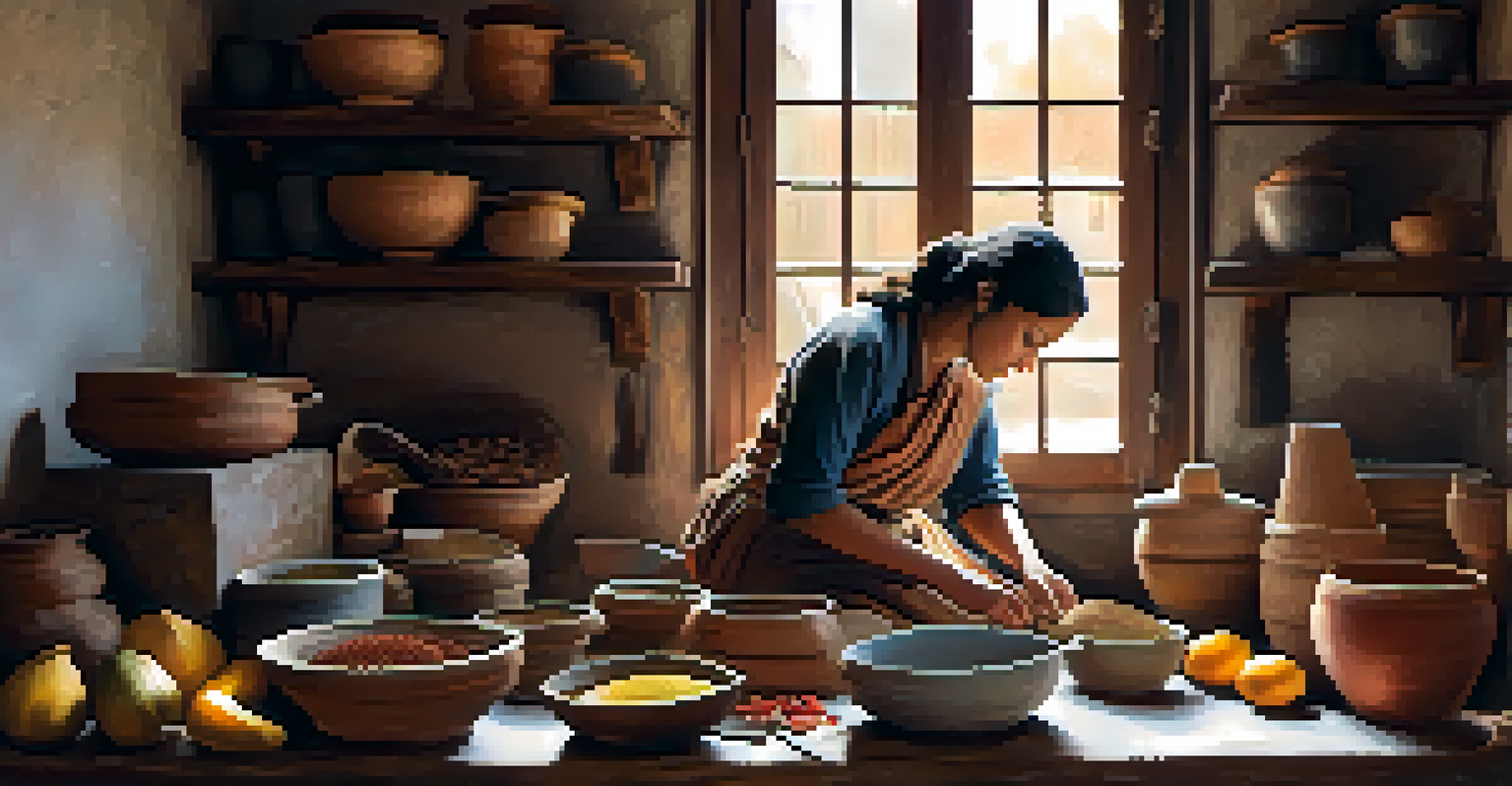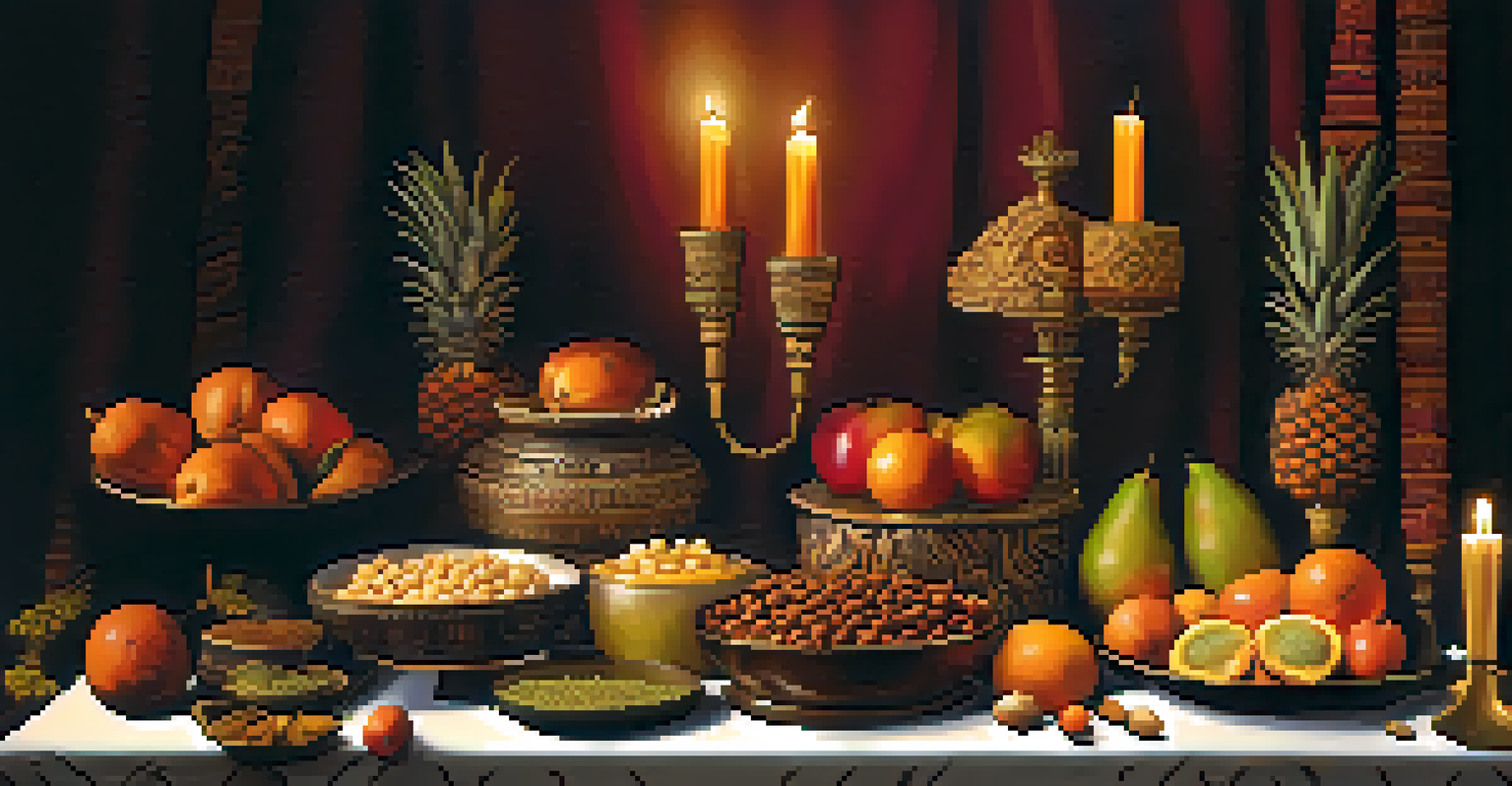Food as a Sacred Offering in African Traditional Religions

Understanding the Role of Food in African Spirituality
In many African traditional religions, food holds a profound spiritual significance. It serves not just as sustenance, but as a vital link between the physical and spiritual realms. This connection underscores the belief that food can bring communities closer to their ancestors and the divine.
Food is symbolic of love when words are inadequate.
Ritual meals often mark important life events, such as births, marriages, and funerals, emphasizing the communal aspect of these practices. For instance, sharing a meal can symbolize unity and reinforce social bonds among participants. This sacred act transforms ordinary food into something that nourishes both the body and the spirit.
Moreover, the types of food offered can vary significantly across cultures, with each ingredient carrying its own symbolic meaning. Common offerings may include fruits, grains, and animal sacrifices, each chosen for their significance in the cultural context. Understanding these nuances helps illuminate the rich tapestry of African spirituality.
Ritual Offerings: The Process of Sacrifice
In many African traditions, food offerings often involve a ritual sacrifice, which is seen as a way to honor ancestors and deities. This process is not merely about the act of giving; it's about the intention and respect behind the offering. Participants typically engage in prayers and invocations, asking for blessings or guidance.

The preparation of the food also carries ritualistic importance. For instance, certain foods may need to be prepared in specific ways or at particular times to align with spiritual beliefs. This attention to detail ensures that the offerings are pure and acceptable to the spirits being honored.
Food as a Spiritual Connector
In African traditional religions, food serves as a vital link between the physical and spiritual realms, fostering community and connection with ancestors.
Once the food is prepared, it is usually placed on an altar or a designated sacred space, where it can be presented to the ancestors or deities. This act of offering is perceived as a powerful gesture, reinforcing the bond between the living and the spiritual world, and fostering a sense of gratitude and respect.
The Symbolism of Specific Foods in Offerings
Different foods hold unique meanings in African traditional religions, reflecting the culture and environment of the community. For example, maize is often seen as a symbol of life and fertility, while kola nuts may represent hospitality and respect. These foods are not just chosen at random; their symbolism plays a key role in the rituals.
There is no love sincerer than the love of food.
In many cultures, fruits like bananas or oranges are offered to signify abundance and prosperity. They are often used in ceremonies that celebrate growth or new beginnings, like weddings or harvest festivals. This symbolic use of food adds depth to the rituals, making them more meaningful for participants.
Understanding the significance of these foods enhances our appreciation for the traditions themselves. It reveals how deeply intertwined food is with identity, spirituality, and community values, illustrating that every meal has a story to tell.
Food and Community: Building Bonds through Rituals
Food offerings in African traditional religions often serve as a communal activity, bringing people together in shared purpose. Gatherings for these rituals foster connections among family members and community members, creating a sense of belonging. This communal aspect is vital in maintaining cultural heritage and traditions.
During these events, participants typically engage in storytelling, sharing memories and experiences that strengthen social ties. The act of preparing and consuming the food together transforms the experience into one of unity and collective spirituality. It’s more than just about the food; it’s about the relationships that are nurtured along the way.
Rituals Reinforce Community Bonds
Communal food offerings not only nourish the body but also strengthen social ties and cultural heritage among participants.
Additionally, these communal rituals often reinforce moral values and social norms, reminding participants of their responsibilities to each other and their ancestors. This blend of spirituality, community, and food creates a rich tapestry of cultural practices that continue to thrive today.
The Role of Women in Food Offerings and Rituals
Women often play a central role in the preparation and presentation of food in African traditional religions. Their involvement goes beyond mere cooking; it reflects their status as nurturers and caretakers within the community. Women are frequently the ones who ensure that rituals are conducted according to tradition and that offerings are made with the utmost respect.
In many cultures, women possess knowledge of food preparation techniques and the significance of various ingredients. This expertise is passed down through generations, highlighting the importance of oral traditions in preserving cultural practices. Their contributions are essential to the success of rituals, as they create the environment necessary for spiritual connection.
Moreover, the involvement of women in these rites can empower them within their communities. By actively participating in spiritual practices, they affirm their roles and influence, contributing to the overall cohesion and stability of their societies. This dynamic illustrates the integral part women play in the fabric of African traditional religions.
Modern Influences on Traditional Food Offerings
In today's globalized world, traditional food offerings in African religions are influenced by various factors, including urbanization and the availability of ingredients. As communities evolve, some rituals may adapt to incorporate new foods or practices, reflecting the changing landscape of cultural identity. This evolution can be seen as both a challenge and an opportunity for preserving traditions.
While some may worry about the dilution of cultural practices, others argue that adaptation is a natural part of any living tradition. For instance, urban communities might substitute local ingredients for traditional ones due to accessibility. This flexibility ensures that rituals remain relevant and resonate with contemporary participants.
Women Empowered through Food Rituals
Women play a crucial role in food preparation and rituals, showcasing their influence and nurturing status within their communities.
Additionally, the fusion of traditional and modern practices can lead to innovative rituals that honor the past while embracing the present. This blending showcases the resilience and creativity of African cultures, ensuring that the spiritual significance of food continues to flourish in diverse contexts.
Conclusion: The Enduring Significance of Food in Spirituality
Food remains a vital aspect of African traditional religions, embodying deep cultural, spiritual, and communal values. The rituals surrounding food offerings illustrate how interconnected these elements are, creating a rich tapestry of meaning that transcends generations. As communities adapt and evolve, the significance of these practices continues to endure.
Through communal gatherings, the preparation of symbolic foods, and the honoring of ancestors, participants reinforce their identities and cultural heritage. This ongoing relationship with food and spirituality highlights the importance of honoring traditions while embracing change.

Ultimately, food as a sacred offering serves as a reminder of the bonds that tie individuals to their communities and ancestors, ensuring that these invaluable practices remain alive and vibrant for future generations.